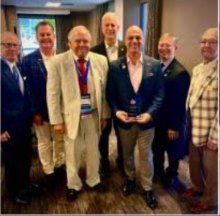
As the highly anticipated trial of Dr. Keita Vanterpool v. Federation of Chiropractic Licensing Boards (FCLB) approaches its July 8, 2024 start date, recent legal maneuvers have intensified the spotlight on issues of racial discrimination within the chiropractic profession. A pre-trial conference held on June 21, 2024, set the stage for a contentious battle over the admissibility of expert testimony that could be pivotal in the case.
CLICK HERE for more history on the case
Gallagher’s Expert Analysis: A Deep Dive into Systemic Bias
Dr. Charles A. Gallagher, a distinguished professor with extensive expertise in sociology and race relations, has provided an expert report that highlights the systemic and historical racial biases entrenched in the chiropractic profession. Gallagher’s testimony seeks to illuminate how these biases could have influenced the decision to suspend Dr. Vanterpool, a Black woman, from her roles within the FCLB.
CLICK HERE for a copy of Gallagher's Report
Gallagher’s report underscores several critical points:
- Historical Exclusion: He details the long history of racial exclusion in the chiropractic field, noting that African Americans have been systematically underrepresented.
- Stereotypical Biases: He explains how stereotypes, such as the "angry Black woman" trope, adversely affect the perception and treatment of Black professionals, particularly women.
- Lack of Policy Violations: Gallagher points out that Dr. Vanterpool was suspended despite not violating any specific FCLB bylaws, suggesting that racial bias played a role in her punitive treatment.
FCLB’s Motion to Exclude: A Strategic Move
In response, the FCLB has filed a motion to exclude Gallagher’s testimony, arguing that:
- Irrelevance: They claim the historical context of racial discrimination is not pertinent to the specific case of Vanterpool’s suspension.
- Improper Legal Conclusions: They assert Gallagher’s conclusions about bylaws violations are speculative and beyond his expertise.
- Potential Jury Confusion: The FCLB contends that Gallagher’s testimony might mislead the jury into thinking that any role of race, no matter how minor, is sufficient for a verdict in Vanterpool’s favor.
Weaknesses in FCLB’s Arguments
However, the FCLB's arguments to exclude Gallagher's testimony reveal several weaknesses:
- Narrow Interpretation of Relevance: Dismissing the historical context ignores the importance of systemic bias in understanding current discriminatory practices. Gallagher’s insights into the broader patterns of racism provide critical context that can help the jury make an informed decision.
- Underestimation of Expert Analysis: Gallagher’s role is to shed light on discriminatory patterns, not to interpret bylaws. His expertise in identifying systemic bias is precisely what can help the jury understand how such biases might have influenced the FCLB’s actions.
- Misleading Concerns About Jury Confusion: Expert testimony often involves complex issues. Gallagher can help clarify these complexities for the jury, rather than confuse them. His testimony aims to elucidate how implicit biases operate, not to oversimplify the legal standards.
The Chiropractic Cartel and the Power Struggle
At the heart of the Vanterpool case lies a broader issue of monopolistic control within the chiropractic profession, often referred to as the "Chiropractic Cartel." This cartel is characterized by the dominance of the FCLB and the National Board of Chiropractic Examiners (NBCE), which together exert significant influence over chiropractic licensing, education, and regulatory standards. NBCE, FCLB and state regulatory board members bounce back and forth between these organizations sometimes serving on all three at the same time. These organizations have been accused of creating an exclusionary environment that uses student loan money to fund its efforts, limits diversity of thought and are now being accused of perpetuating a lack of representation for minorities.
The Chiropractic Summit, a key gathering of influential figures in the chiropractic community, plays a crucial role in this power structure. Attendance at the Summit is highly coveted, as it provides opportunities for networking, influence, and setting the future direction of the profession. Dr. Vanterpool’s efforts to attend the Summit independently, bypassing the FCLB’s president, led to significant friction and ultimately her suspension.
CLICK HERE for more on that story
The Optics of Exclusion: Does It Signal Guilt?
The FCLB’s aggressive move to exclude Gallagher’s testimony may have unintended consequences. By attempting to block a comprehensive analysis of potential racial bias, the FCLB appears to be avoiding a full and transparent examination of their practices. This strategy could be perceived as an acknowledgment of the very discrimination they are accused of.
As the trial date looms, the stakes are high. The outcome will not only impact Dr. Vanterpool’s future but also set a precedent for how racial discrimination cases are handled within professional regulatory bodies. The public and the chiropractic community will be watching closely to see if justice is served and if the systemic issues Gallagher highlights are addressed in the courtroom.
Conclusion
The Vanterpool case highlights the intersection of race, power, and professional politics within the chiropractic field. Gallagher’s expert testimony offers a crucial perspective on systemic biases, while the FCLB’s efforts to exclude this testimony raise questions about their commitment to fairness and transparency. As the trial approaches, the broader implications for diversity and equity in chiropractic regulation will be under intense scrutiny.
